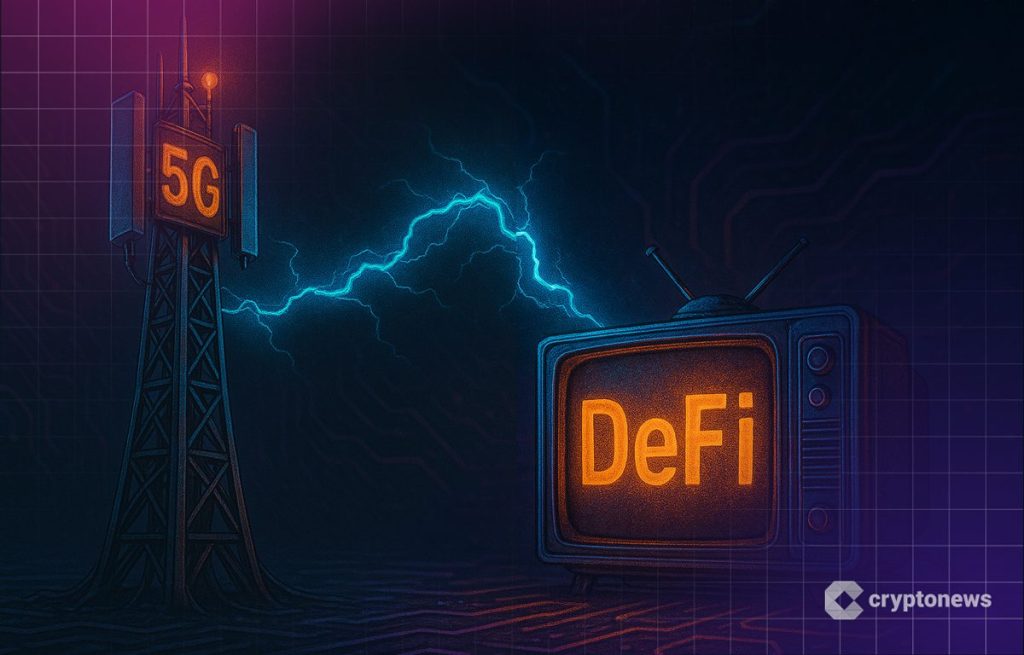TVs Could Dominate DeFi Next, Predicts Telecom Billionaire’s Heir
The living room screen might soon become your gateway to decentralized finance—at least according to one unlikely oracle.
Move over, MetaMask. A telecom scion is betting smart TVs will onboard the next wave of DeFi users. The pitch? Bigger screens mean fewer fat-finger trades—and maybe even grandma finally understanding what an NFT is.
Of course, Wall Street will still find a way to sell TV-based derivatives. Some things never change.

Merging the Best of Both Worlds
Chase spoke as other telecom heavyweights venture into the blockchain sector. Nokia, the Finnish mobile phone company, has submitted a patent for a “device, method, and computer program” to encrypt crypto assets.
According to Chase, telecom carriers around the world are quietly exploring “bandwidth-as-a-service for blockchain infrastructure as well as SIM-based identity layers for on-chain KYC [know-your-customer]” verification.
He sees “enormous opportunity” in bundling crypto wallets into mobile service plans and believes that telecom companies have a business case to enter the space, eyeing Web3 as a potential new revenue pillar.
But DeFi cannot be truly global unless it is accessible in low-connectivity regions, the entrepreneur and investor said. Traditional telecom infrastructure, such as satellites, mesh networks, and 5G, can bridge that gap.
For example, Chase said “satellite internet enables blockchain nodes and wallets to operate in regions without fiber or mobile coverage,” adding:
“When you combine that with 5G’s latency benefits, you’re looking at a pathway to real-time, mobile-native DeFi at scale.”
Still, bridging telecom systems with blockchain is hard. Chase says legacy telecoms excel in uptime and reliability but rely on centralized authorities. Blockchain, on the other hand, is decentralized, but “lacks redundancy” and quality of service is fragile.
“We need to bridge that gap by introducing telecom-grade reliability into web3, including node resiliency, multi-region support, and failover mechanisms,” he says. “That’s where the future lies: merging the best of both worlds.”
Could 0% Capital Gains Tax on Bitcoin Spur Adoption?
Cryptocurrency taxation remains a controversial subject across the industry, mainly because regulators continue to shift goalposts as the industry matures. Early crypto investors are also wired to evade middlemen in whatever form.
As executive director of crypto-focused political action committee Make America Wealthy Again Super PAC, Chase Ergen has long pushed for 0% capital gains tax on crypto transactions under $1 million.
“If you’re taxing every coffee someone buys with Bitcoin, you kill usability,” he told Cryptonews.
He argues that capital gains tax exemption “unlocks grassroots-level participation in digital finance.” It also signals that governments are serious about embracing crypto as a functional currency, not just an asset class.
“It’s pro-innovation, pro-middle class, and pro-growth,” Chase said.
Some critics fear crypto tax incentives could lead to regulatory arbitrage or speculative bubbles. Chase dismissed those allegations, saying:
“Regulatory arbitrage already exists; the question is whether we want to lead responsibly or be left behind. Smart crypto policy doesn’t mean blind deregulation. It means clarity, proportionality, and fostering innovation within well-defined boundaries.”
But not everyone agrees with Chase’s views. Former French diplomat and CEO of the European Climate Foundation Laurence Tubiana said governments should tax AI and crypto to raise funds for tackling the climate crisis.
Telecom Meets DeFi
When asked what led to his switch from telecoms to crypto, Chase said: “Telecom connects people, but crypto gives them sovereignty.”
He believes blockchain could become the “foundation of global finance” and that it is the logical evolution of connectivity — a system that not only transmits information but also transfers value and enables ownership.
That’s the reason he’s investing in crypto projects that focus on infrastructure, addressing issues like scalability, compliance, or usability. “I’m not interested in HYPE coins or short-term flips,” he stressed.
On the regulatory front, Chase said key changes are needed for broader institutional adoption of crypto.
“We need standardized definitions, harmonized tax treatment, and clear pathways for regulated financial products,” he stated.

